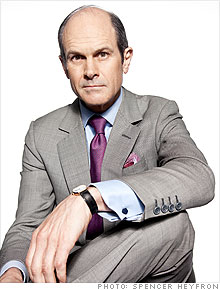Search News
FORTUNE -- What makes America great?
That debate has been more heated than usual because of the volatile election results of 2010 (and 2008), Tea Partiers, the recession, and the financial crisis. But it's heating up for another reason as well -- a spreading realization that the widely held current answer to the question no longer makes sense.

The conventional case for U.S. greatness has long rested on our economic success, and understandably so. We're the world's richest nation by far, where the ordinary citizen achieves a living standard unrivaled in any other country of significant size. The problem, the source of our growing identity crisis, is the daily evidence that we're approaching the end of our time at the top. China's economy keeps growing 10% a year, while ours is limping; China, not the U.S., seizes the lead in tomorrow's industries, such as alternative energy; China rolls out a new stealth fighter jet, while we cancel military programs.
A Gallup poll last year found that just 17% of Americans agree that the U.S. "is No. 1 in the world economically." The other 83% are wrong -- our GDP is still No. 1 by a mile -- but only their timing is off. GDP is essentially population times productivity, so it's simple math that China will overtake us, perhaps within a decade. So when we're not the world's top economy, what will make us great?
We can learn from our experience going through the opposite identity crisis 70 years ago. In February 1941, Henry Luce published in Life his essay "The American Century," which Luce biographer Alan Brinkley calls "the most influential article he would ever publish." The crisis then was America's reluctance to accept that it had become, as Luce said, "the most powerful and vital nation in the world." It had to reject isolationism and lead the allies through World War II. That began our current view of what makes the U.S. exceptional.
We must move beyond self-esteem focused intensely on output. Andrew L. Yarrow, senior policy analyst at the nonpartisan Independent Sector, explains this persuasively in a fascinating new book, Measuring America: How Economic Growth Came to Define American Greatness in the Late Twentieth Century. "The United States after World War II," he told me, "increasingly saw itself as the world's greatest because of its measurably booming economy rather than its political ideals, its natural beauty, or its people."
A major reason for this was the Cold War. When Soviet leader Nikita Khrushchev said, "We will bury you," he meant it economically. We needed to show that our system was better for the average citizen than communism, and making that case was not always a slam-dunk. So besides discussing democracy and freedom, we taught our kids that America's great achievement was producing widely dispersed wealth on an unmatched scale. When that audacious claim proved true, we didn't move on to a new concept of greatness; our ideas seemed confirmed.
"The American Century" was about becoming the world's largest economy. Now we must come to terms with not being that, yet still being great. In a December poll, 80% of Americans agreed that "the U.S. has a unique character that makes it the greatest country in the world," but a large majority of them also believed "we're at risk of losing it."
We need a powerful new concept of American greatness that doesn't rely on GDP. For most of our history we saw our unique character arising from the ideals of freedom, democracy, and openness, notions that were feeling shopworn but now gain new vitality as a pointed contrast to China. Shifting to a more economically driven concept was seductively easy. Shifting back will be harder. Whether we can do it -- rather than resenting and denying our changed role in the world -- will be a new test of greatness. ![]()






| Company | Price | Change | % Change |
|---|---|---|---|
| Ford Motor Co | 8.29 | 0.05 | 0.61% |
| Advanced Micro Devic... | 54.59 | 0.70 | 1.30% |
| Cisco Systems Inc | 47.49 | -2.44 | -4.89% |
| General Electric Co | 13.00 | -0.16 | -1.22% |
| Kraft Heinz Co | 27.84 | -2.20 | -7.32% |
| Index | Last | Change | % Change |
|---|---|---|---|
| Dow | 32,627.97 | -234.33 | -0.71% |
| Nasdaq | 13,215.24 | 99.07 | 0.76% |
| S&P 500 | 3,913.10 | -2.36 | -0.06% |
| Treasuries | 1.73 | 0.00 | 0.12% |
|
Bankrupt toy retailer tells bankruptcy court it is looking at possibly reviving the Toys 'R' Us and Babies 'R' Us brands. More |
Land O'Lakes CEO Beth Ford charts her career path, from her first job to becoming the first openly gay CEO at a Fortune 500 company in an interview with CNN's Boss Files. More |
Honda and General Motors are creating a new generation of fully autonomous vehicles. More |
In 1998, Ntsiki Biyela won a scholarship to study wine making. Now she's about to launch her own brand. More |
Whether you hedge inflation or look for a return that outpaces inflation, here's how to prepare. More |